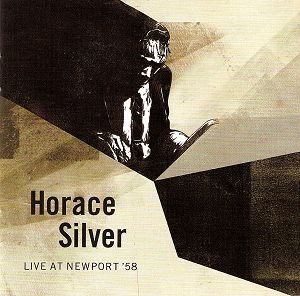1. Introduction by Willis Conover
2. Tippin'
3. The Outlaw
4. Senor Blues
5. Cool Eyes
Horace Silver - Piano
Louis Smith - Trumpet
Junior Cook - Tenor sax
Gene Taylor - Bass
Louis Hayes - Drums
The
1958 Newport Jazz Festival was immortalised
in the classic film documentary Jazz on
a Summer's Day. Horace Silver's new quintet
played there but wasn't featured in the film.
This performance might have been lost altogether
had not producer Michael Cuscuna unearthed
a recording of the session. Horace Silver
had already made his name as co-leader with
Art Blakey of the Jazz Messengers, which became
Blakey's band when Silver left in 1956 to
form his own group. Horace had also established
himself as a notable jazz composer with such
numbers as Doodlin' and The Preacher.
This
1958 set is introduced by DJ Willis Conover
and the band then launches into Tippin',
a typically lively Silver composition, which
shows off the quintet's talents. Tenorist
Junior Cook is well-known but the surprise
here is trumpeter Louis Smith, an excellent
trumpeter who reminds me of Fats Navarro and
Clifford Brown in his facility for getting
around bebop sequences and creating thrilling
solos. Smith didn't stay with the Horace Silver
Quintet (he was superseded by Blue Mitchell)
and it is a pity that he is so little remembered.
Horace Silver's piano solo grooves along infectiously,
although Louis Hayes's drums here and elsewhere
are rather too dominant, with disruptive snare-drum
accents interrupting the flow of the rhythm.
The
Outlaw is an intriguingly structured piece,
built up from diverse sections of varying
length and bits of Latin-Americana. The band
negotiates it well and, like many Silver compositions,
it is immediately catchy. So, too, is Senor
Blues, understandably one of Horace's
most popular pieces with its propulsive vamp.
The piano solo is a masterpiece of restrained
yet funky blues playing. The set ends with
what Horace introduces as "our theme song",
Cool Eyes, a tune which is very much
bebop but which shows the genre transforming
into hard bop (which was actually a more accessible
form of bebop).
This
session is a welcome discovery, especially
as the sound is remarkably good for a festival
recording, although the four long musical
tracks tend to sound primarily like extended
blowing sessions rather than very structured
performances. So - a good Horace Silver album
but perhaps not absolutely essential one for
anyone except the Silver completist or for
newcomers interested in discovering the composer-pianist's
particular brand of musical magic.
Tony
Augarde
